五种基本句型及练习汇编
最新五大基本句型及习题

五大基本句型及习题------------------------------------------作者xxxx------------------------------------------日期xxxx英语五种基本句型列式如下:基本句型一: S +V (主+谓)基本句型二: S +V +P (主+系+表)基本句型三:S +V+O (主+谓+宾)基本句型四: S+V +IO +O(主+谓+间宾+直宾)基本句型五: S +V +O+C(主+谓+宾+宾补)基本句型一S +V(主+谓)此句型的句子有一个共同特点,即句子的谓语动词都能表达完整的意思。
这类动词叫做不及物动词,后面可以跟副词、介词短语、状语从句等.这些动词常见的有:take place, happen, break out, appear,disappear, apologize, arrive, come, die, exist, fall,rise, hang(可作及物动词或不及物动词)等等.(2)有些动词如wash,sell, burn,write, clean,draw, cook, read等等可以在后面加副词表示主语的性质。
S V(不及物动词)1. Time2. The moon 3。
The man4.We all 5。
Everybody 6. I7. They8. He9。
He10。
Theyflies。
rose。
cooked.eat, and drink。
laughed? woke。
talked for half an hour.walked yesterdayis playinghave gone基本句型二S +V+P(主+系+表)此句型的句子有一个共同的特点:句子谓语动词都不能表达一个完整的意思,必须加上一个表明主语身份或状态的表语构成复合谓语,才能表达完整的意思。
这类动词叫做连系动词。
系动词分两类:be, look,feel,smell,taste,sound等属一类,表示情况;get, grow,become, turn,go等属另一类,表示变化.be 本身没有什么意义,只起连系主语和表的作用。
初二英语基本五大句型练习题
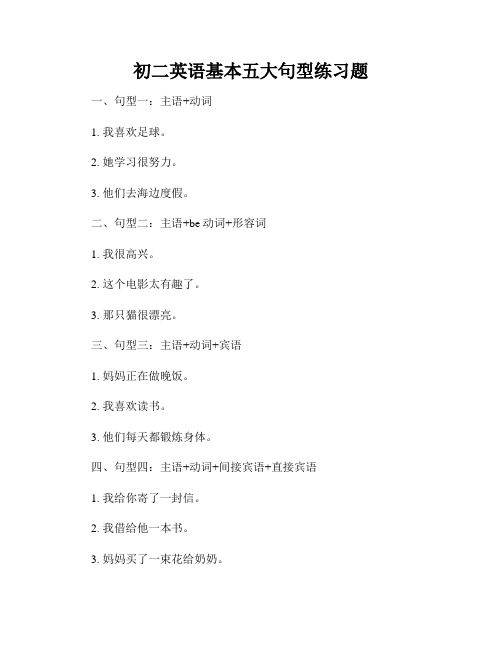
初二英语基本五大句型练习题
一、句型一:主语+动词
1. 我喜欢足球。
2. 她学习很努力。
3. 他们去海边度假。
二、句型二:主语+be动词+形容词
1. 我很高兴。
2. 这个电影太有趣了。
3. 那只猫很漂亮。
三、句型三:主语+动词+宾语
1. 妈妈正在做晚饭。
2. 我喜欢读书。
3. 他们每天都锻炼身体。
四、句型四:主语+动词+间接宾语+直接宾语
1. 我给你寄了一封信。
2. 我借给他一本书。
3. 妈妈买了一束花给奶奶。
五、句型五:主语+动词+宾语+宾语补足语
1. 她使我感到惊讶。
2. 我们看到他们在玩游戏。
3. 这首歌使我想起了过去的回忆。
以上是初二英语基本五大句型的练习题。
通过解答这些练习题,可
以加深对不同句型的理解和掌握,提高英语语法的运用能力。
希望同
学们能够认真完成这些练习,不断巩固所学知识,并能够灵活运用到
日常交流中。
英语学习需要坚持和积累,相信通过不断的练习和努力,大家一定能够取得更好的成绩。
加油!。
五种基本句型(含练习及答案)

报的一位记者作有关东欧目前局势的重要报告。
翻译:我们发现大礼堂坐满了学生和教师,在听人民日报的 一位同志作有关东欧目前局势的重要报告。
???分析结构: 我们 发现(谓语) 大 礼堂 full of 学生和老师(复数) who 在听(谓语)重要 报告 made by 一位同志 from 人民日报 about 目前局势 in 东欧。
SV 2.My grandma is sleeping now. 3.I will stay in Shanghai for a week.
4.Lucy arrived in Beijing yesterday
基本句型 二
S +V +O(主+谓+宾)
特点:谓语动词都是实义动词,但不能表达 完整的意思,必须跟宾语,即动作的承受者, 才能使意思完整。这类动词叫做及物动词。
▪ leave(留给某人……), leave sb sth (leave sth to sb)
▪ pass(递给某人……), pass sb sth (pass sth to sb)
▪ read(给某人读……), read sb sth (read sth to sb)
▪ write(给某人写……), write sb sth (write sth to sb)
▪ pay(支付给某人……), pay sb sth (pay sth for sb)
▪ buy(为某人买……), buy sb sth (buy sth for sb)
▪ do(为某人做……) do sb sth (do sth for sb)
▪ sing(为某人唱……) sing sb sth (sing sth for sb)
英语五种基本句型及练习附答案
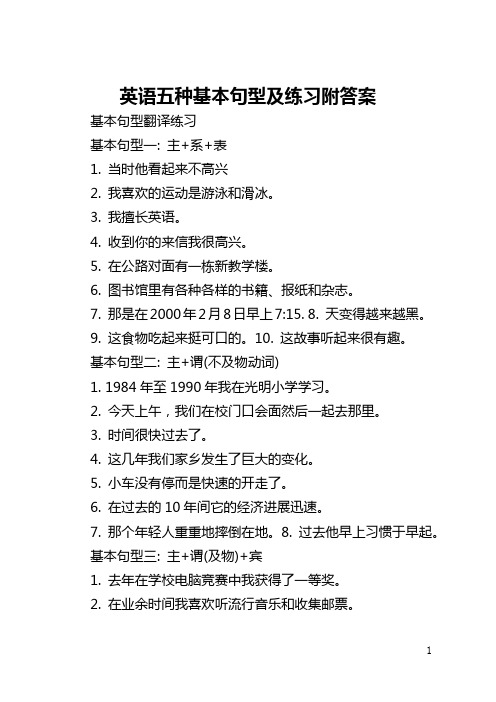
英语五种基本句型及练习附答案基本句型翻译练习基本句型一: 主+系+表1. 当时他看起来不高兴2. 我喜欢的运动是游泳和滑冰。
3. 我擅长英语。
4. 收到你的来信我很高兴。
5. 在公路对面有一栋新教学楼。
6. 图书馆里有各种各样的书籍、报纸和杂志。
7. 那是在2000年2月8日早上7:15. 8. 天变得越来越黑。
9. 这食物吃起来挺可口的。
10. 这故事听起来很有趣。
基本句型二: 主+谓(不及物动词)1. 1984年至1990年我在光明小学学习。
2. 今天上午,我们在校门口会面然后一起去那里。
3. 时间很快过去了。
4. 这几年我们家乡发生了巨大的变化。
5. 小车没有停而是快速的开走了。
6. 在过去的10年间它的经济进展迅速。
7. 那个年轻人重重地摔倒在地。
8. 过去他早上习惯于早起。
基本句型三: 主+谓(及物)+宾1. 去年在学校电脑竞赛中我获得了一等奖。
2. 在业余时间我喜欢听流行音乐和收集邮票。
3.几天前我和我兄弟骑自行车去看电影。
4. 我们也在校园内和周围种上了许多树。
5. 晚上时,我可以看电视新闻或看报纸。
6. 在回家的路上他把钱给丢了。
7. 昨晚大约九点的时候,我正在做作业。
8. 才艺展示(Tlent Show)将于6月18日在电视XX举行。
9. 下午,我将带你们转转,看一看一些名胜。
10. 盼望能尽早见到你。
基本句型四: 主+谓(及物)+双宾(间宾+直宾)1. 去年王老师教我们英语。
2. 明天我要给他写封信,告诉他这个好消息。
3. 他们给他提供了一份工作,但他拒绝了。
4. 在我14岁生日时,爸爸给我买了一辆新自行车。
5. 昨晚我花了两小时才完成作业。
6. 对不起,能问你一个问题吗?基本句型五: 主+谓(及物)+复合宾语(宾+宾补)1. 当时我看到那些孩子在河边玩。
2. 我们正在使我们的GJ变得越来越美丽。
3. 当我到达教室时,我发现里边没有人。
4. 昨天下午在公交车上我的钱包让人给偷了。
英语五大基本句型及习题
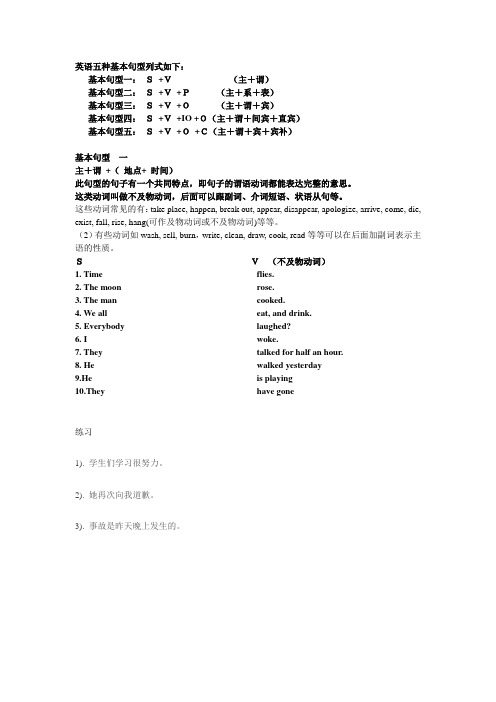
英语五种基本句型列式如下:基本句型一:S+V(主+谓)基本句型二:S+V+P(主+系+表)基本句型三:S+V+O(主+谓+宾)基本句型四:S+V+IO +O(主+谓+间宾+直宾)基本句型五:S+V+O+C(主+谓+宾+宾补)基本句型一主+谓+(地点+ 时间)此句型的句子有一个共同特点,即句子的谓语动词都能表达完整的意思。
这类动词叫做不及物动词,后面可以跟副词、介词短语、状语从句等。
这些动词常见的有:take place, happen, break out, appear, disappear, apologize, arrive, come, die, exist, fall, rise, hang(可作及物动词或不及物动词)等等。
(2)有些动词如wash, sell, burn,write, clean, draw, cook, read等等可以在后面加副词表示主语的性质。
SV(不及物动词)1. Time2. The moon3. The man4. We all5. Everybody6. I7. They8. He9.He10.They flies.rose.cooked.eat, and drink. laughed?woke.talked for half an hour. walked yesterdayis playinghave gone练习1). 学生们学习很努力。
_____________________________________2). 她再次向我道歉。
_______________________________________3). 事故是昨天晚上发生的。
_____________________________________基本句型二主+系+表+(地点+ 时间)此句型的句子有一个共同的特点:句子谓语动词都不能表达一个完整的意思,必须加上一个表明主语身份或状态的表语构成复合谓语,才能表达完整的意思。
高中英语英语五种基本句型及练习
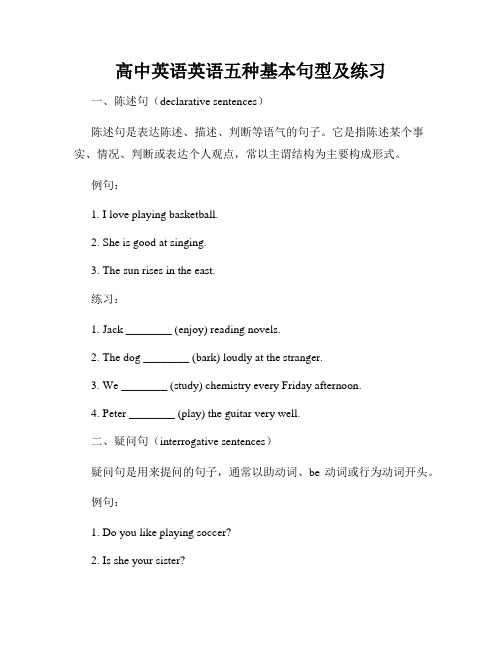
高中英语英语五种基本句型及练习一、陈述句(declarative sentences)陈述句是表达陈述、描述、判断等语气的句子。
它是指陈述某个事实、情况、判断或表达个人观点,常以主谓结构为主要构成形式。
例句:1. I love playing basketball.2. She is good at singing.3. The sun rises in the east.练习:1. Jack ________ (enjoy) reading novels.2. The dog ________ (bark) loudly at the stranger.3. We ________ (study) chemistry every Friday afternoon.4. Peter ________ (play) the guitar very well.二、疑问句(interrogative sentences)疑问句是用来提问的句子,通常以助动词、be动词或行为动词开头。
例句:1. Do you like playing soccer?2. Is she your sister?3. Where is the nearest supermarket?练习:1. ________ you watch TV last night?2. ________ the weather like today?3. ________ Tim have a new car?三、祈使句(imperative sentences)祈使句是用来表达命令、请求、建议等意思的句子。
它通常以动词原形开头。
例句:1. Please close the door.2. Study hard for the exam.3. Let's go for a walk.练习:1. ________ your homework before going to bed.2. ________ your parents for permission before going out.3. ________ up early tomorrow.四、感叹句(exclamatory sentences)感叹句用来表达强烈的感情、惊奇、赞美、喜悦等。
(完整版)英语五大基本句型详解及相关练习(配答案)
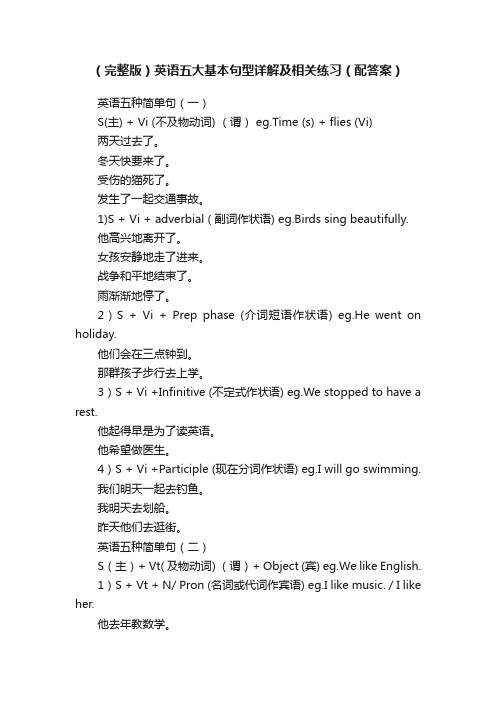
(完整版)英语五大基本句型详解及相关练习(配答案)英语五种简单句(一)S(主) + Vi (不及物动词) (谓) eg.Time (s) + flies (Vi)两天过去了。
冬天快要来了。
受伤的猫死了。
发生了一起交通事故。
1)S + Vi + adverbial ( 副词作状语) eg.Birds sing beautifully.他高兴地离开了。
女孩安静地走了进来。
战争和平地结束了。
雨渐渐地停了。
2)S + Vi + Prep phase (介词短语作状语) eg.He went on holiday.他们会在三点钟到。
那群孩子步行去上学。
3)S + Vi +Infinitive (不定式作状语) eg.We stopped to have a rest.他起得早是为了读英语。
他希望做医生。
4)S + Vi +Participle (现在分词作状语) eg.I will go swimming.我们明天一起去钓鱼。
我明天去划船。
昨天他们去逛街。
英语五种简单句(二)S(主)+ Vt( 及物动词) (谓)+ Object (宾) eg.We like English.1)S + Vt + N/ Pron (名词或代词作宾语) eg.I like music. / I like her.他去年教数学。
我们已收到了他们的来信。
2)S + Vt + Infinitive (不定式作宾语) eg. I want to help him.他爸爸期待拥有一家工厂。
他们假装在看书。
我尝试去解决那个问题。
常用于这个句型的动词有:attempt ,dare ,decide, desire, expect, hope, wish, intend, learn, need, offer, pretend, promise, propose, refuse, want, manage, plan, fail, try, agree等。
英语五种基本句型及练习附答案

英语五种基本句型及练习附答案基本句型翻译练习基本句型一: 主+系+表1. 当时他看起来不高兴2. 我喜欢的运动是游泳和滑冰。
3. 我擅长英语。
4. 收到你的来信我很高兴。
5. 在公路对面有一栋新教学楼。
6. 图书馆里有各种各样的书籍、报纸和杂志。
7. 那是在2000年2月8日早上7:15. 8. 天变得越来越黑。
9. 这食物吃起来挺可口的。
10. 这故事听起来很有趣。
基本句型二: 主+谓(不及物动词)1. 1984年至1990年我在光明小学学习。
2. 今天上午,我们在校门口会面然后一起去那里。
3. 时间很快过去了。
4. 这几年我们家乡发生了巨大的变化。
5. 小车没有停而是快速的开走了。
6. 在过去的10年间它的经济进展迅速。
7. 那个年轻人重重地摔倒在地。
8. 过去他早上习惯于早起。
基本句型三: 主+谓(及物)+宾1. 去年在学校电脑竞赛中我获得了一等奖。
2. 在业余时间我喜欢听流行音乐和收集邮票。
3.几天前我和我兄弟骑自行车去看电影。
4. 我们也在校园内和周围种上了许多树。
5. 晚上时,我可以看电视新闻或看报纸。
6. 在回家的路上他把钱给丢了。
7. 昨晚大约九点的时候,我正在做作业。
8. 才艺展示(Tlent Show)将于6月18日在电视XX举行。
9. 下午,我将带你们转转,看一看一些名胜。
10. 盼望能尽早见到你。
基本句型四: 主+谓(及物)+双宾(间宾+直宾)1. 去年王老师教我们英语。
2. 明天我要给他写封信,告诉他这个好消息。
3. 他们给他提供了一份工作,但他拒绝了。
4. 在我14岁生日时,爸爸给我买了一辆新自行车。
5. 昨晚我花了两小时才完成作业。
6. 对不起,能问你一个问题吗?基本句型五: 主+谓(及物)+复合宾语(宾+宾补)1. 当时我看到那些孩子在河边玩。
2. 我们正在使我们的GJ变得越来越美丽。
3. 当我到达教室时,我发现里边没有人。
4. 昨天下午在公交车上我的钱包让人给偷了。
五大基本句型及习题

英语五种基本句型列式如下:基本句型一:S+V(主+谓)基本句型二:S+V+P(主+系+表)基本句型三:S+V+O(主+谓+宾)基本句型四:S+V+IO +O(主+谓+间宾+直宾)基本句型五:S+V+O+C(主+谓+宾+宾补)基本句型一S+V(主+谓)此句型的句子有一个共同特点,即句子的谓语动词都能表达完整的意思。
这类动词叫做不及物动词,后面可以跟副词、介词短语、状语从句等。
这些动词常见的有:take place, happen, break out, appear, disappear, apologize, arrive, come, die, exist, fall, rise, hang(可作及物动词或不及物动词)等等。
(2)有些动词如wash, sell, burn,write, clean, draw, cook, read等等可以在后面加副词表示主语的性质。
SV(不及物动词)1. Time2. The moon3. The man4. We all5. Everybody6. I7. They8. He9.He10.They flies.rose.cooked.eat, and drink. laughed?woke.talked for half an hour. walked yesterdayis playinghave gone基本句型二S+V+P(主+系+表)此句型的句子有一个共同的特点:句子谓语动词都不能表达一个完整的意思,必须加上一个表明主语身份或状态的表语构成复合谓语,才能表达完整的意思。
这类动词叫做连系动词。
系动词分两类:be, look, feel,smell,taste,sound等属一类,表示情况;get, grow, become, turn,go等属另一类,表示变化。
be 本身没有什么意义,只起连系主语和表的作用。
其它系动词仍保持其部分词义另:stay,prove,remain,stand(3)形容词,名词,现在分词,过去分词,不定式,介词都可以放在某些连系动词后做表语。
英语五种基本句型及练习
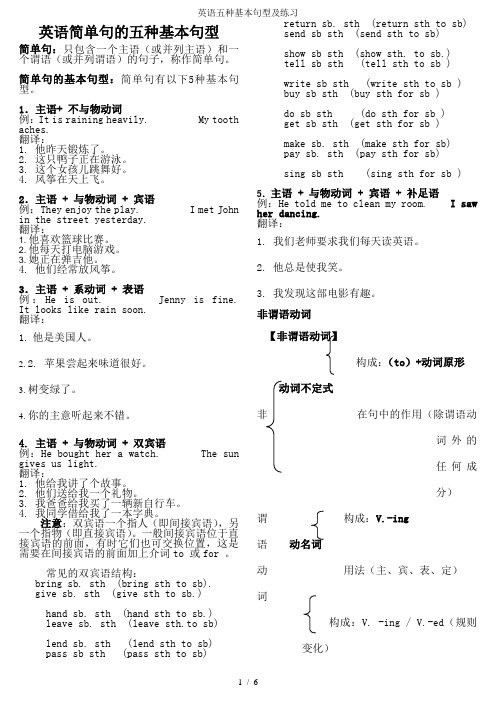
英语简单句的五种基本句型简单句:只包含一个主语(或并列主语)和一个谓语(或并列谓语)的句子,称作简单句。
简单句的基本句型:简单句有以下5种基本句型。
1.主语+ 不与物动词 例:It is raining heavily. My tooth aches. 翻译:1. 他昨天锻炼了。
2. 这只鸭子正在游泳。
3. 这个女孩儿跳舞好。
4. 风筝在天上飞。
2.主语 + 与物动词 + 宾语 例:They enjoy the play. I met John in the street yesterday. 翻译:1. 他喜欢篮球比赛。
2. 他每天打电脑游戏。
3. 她正在弹吉他。
4. 他们经常放风筝。
3.主语 + 系动词 + 表语例:He is out. Jenny is fine. It looks like rain soon.翻译:1. 他是美国人。
2. 2. 苹果尝起来味道很好。
3. 树变绿了。
4. 你的主意听起来不错。
4. 主语 + 与物动词 + 双宾语例:He bought her a watch. The sun gives us light. 翻译:1. 他给我讲了个故事。
2. 他们送给我一个礼物。
3. 我爸爸给我买了一辆新自行车。
4. 我同学借给我了一本字典。
注意:双宾语一个指人(即间接宾语),另一个指物(即直接宾语)。
一般间接宾语位于直接宾语的前面,有时它们也可交换位置,这是需要在间接宾语的前面加上介词to 或for 。
常见的双宾语结构:bring sb. sth (bring sth to sb). give sb. sth (give sth to sb.)hand sb. sth (hand sth to sb.) leave sb. sth (leave sth.to sb) lend sb. sth (lend sth to sb) pass sb sth (pass sth to sb)return sb. sth (return sth to sb) send sb sth (send sth to sb)show sb sth (show sth. to sb.)tell sb sth (tell sth to sb ) write sb sth (write sth to sb ) buy sb sth (buy sth for sb ) do sb sth (do sth for sb ) get sb sth (get sth for sb ) make sb. sth (make sth for sb) pay sb. sth (pay sth for sb)sing sb sth (sing sth for sb )5.主语 + 与物动词 + 宾语 + 补足语例:He told me to clean my room. I saw her dancing. 翻译:1. 我们老师要求我们每天读英语。
(完整版)英语五大基本句型及练习
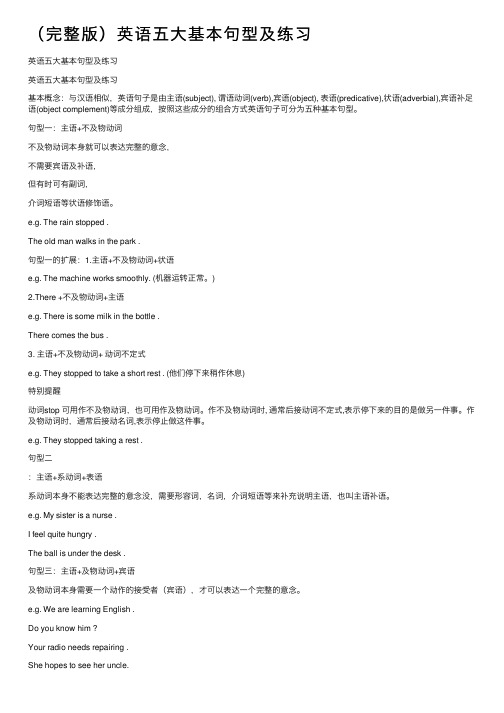
(完整版)英语五⼤基本句型及练习英语五⼤基本句型及练习英语五⼤基本句型及练习基本概念:与汉语相似,英语句⼦是由主语(subject), 谓语动词(verb),宾语(object), 表语(predicative),状语(adverbial),宾语补⾜语(object complement)等成分组成,按照这些成分的组合⽅式英语句⼦可分为五种基本句型。
句型⼀:主语+不及物动词不及物动词本⾝就可以表达完整的意念,不需要宾语及补语,但有时可有副词,介词短语等状语修饰语。
e.g. The rain stopped .The old man walks in the park .句型⼀的扩展:1.主语+不及物动词+状语e.g. The machine works smoothly. (机器运转正常。
)2.There +不及物动词+主语e.g. There is some milk in the bottle .There comes the bus .3. 主语+不及物动词+ 动词不定式e.g. They stopped to take a short rest . (他们停下来稍作休息)特别提醒动词stop 可⽤作不及物动词,也可⽤作及物动词。
作不及物动词时, 通常后接动词不定式,表⽰停下来的⽬的是做另⼀件事。
作及物动词时,通常后接动名词,表⽰停⽌做这件事。
e.g. They stopped taking a rest .句型⼆:主语+系动词+表语系动词本⾝不能表达完整的意念没,需要形容词,名词,介词短语等来补充说明主语,也叫主语补语。
e.g. My sister is a nurse .I feel quite hungry .The ball is under the desk .句型三:主语+及物动词+宾语及物动词本⾝需要⼀个动作的接受者(宾语),才可以表达⼀个完整的意念。
e.g. We are learning English .Do you know him ?句型四:主语+及物动词+间接宾语+直接宾语有些及物动词需要两个宾语才能表达⼀个完整意念。
(完整版)英语五种基本句型及练习
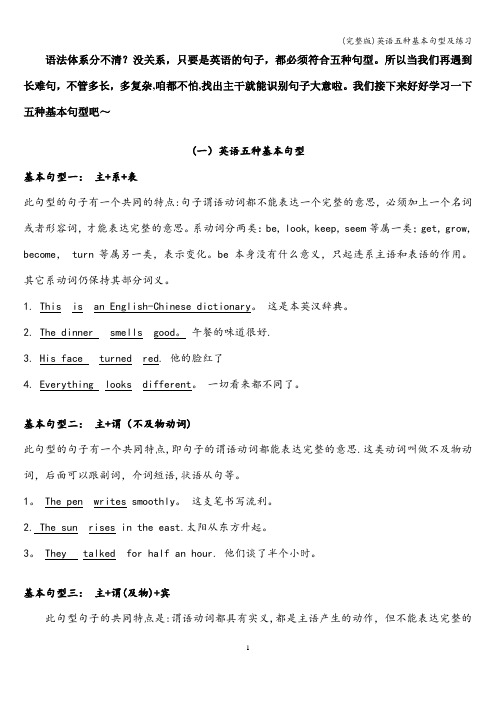
语法体系分不清?没关系,只要是英语的句子,都必须符合五种句型。
所以当我们再遇到长难句,不管多长,多复杂,咱都不怕,找出主干就能识别句子大意啦。
我们接下来好好学习一下五种基本句型吧~(一)英语五种基本句型基本句型一:主+系+表此句型的句子有一个共同的特点:句子谓语动词都不能表达一个完整的意思,必须加上一个名词或者形容词,才能表达完整的意思。
系动词分两类:be, look, keep, seem等属一类;get, grow, become, turn等属另一类,表示变化。
be 本身没有什么意义,只起连系主语和表语的作用。
其它系动词仍保持其部分词义。
1. This is an English-Chinese dictionary。
这是本英汉辞典。
2. The dinner smells good。
午餐的味道很好.3. His face turned red. 他的脸红了4. Everything looks different。
一切看来都不同了。
基本句型二:主+谓(不及物动词)此句型的句子有一个共同特点,即句子的谓语动词都能表达完整的意思.这类动词叫做不及物动词,后面可以跟副词,介词短语,状语从句等。
1。
The pen writes smoothly。
这支笔书写流利。
2. The sun rises in the east.太阳从东方升起。
3。
They talked for half an hour. 他们谈了半个小时。
基本句型三:主+谓(及物)+宾此句型句子的共同特点是:谓语动词都具有实义,都是主语产生的动作,但不能表达完整的意思,必须跟有一个宾语,即动作的承受者,才能使意思完整。
这类动词叫做及物动词。
1。
Who knows the answer?谁知道答案?2. He enjoys reading。
他喜欢看书.3。
My sister is writing a letter at this moment。
(完整)_简单句的五种基本句型讲解及练习题

(完整)_简单句的五种基本句型讲解及练习题简单句的五种基本句型讲解及练习题一、句子成份英语句子成分有主语,谓语,宾语,表语,定语,状语,宾语补足语等。
顺序一般是主语,谓语,宾语,宾语补足语,而表语,定语,状语的位置要根据情况而定.1、主语:表示句子主要说明的人或事物,一般位于句首。
主语可由名词、代词、数词、不定式、动名词、名词化的形容词和主语从句等表示.例如:My sister is a teacher.(名词)我的姐姐是老师。
We often speak English in class。
(代词)我们经常在课上讲英语。
One—third of the students in this class are girls.(数词)这个班三分之一的学生是女生。
2、谓语:谓语说明主语的动作,状态或特征。
可以有不同的时态,语态和语气。
1)简单谓语:she works in a hospital。
她在一家医院工作。
(动作)2)复合谓语: I can speak a little English. 我会说一点英语。
We are reading books。
我们正在读书。
He has gone to Beijing。
他已经去北京了。
3、表语: 它位于系动词(比如be)之后,说明主语身份,特征,属性或状态。
My sister is a teacher。
(我的姐姐是老师。
)The weather has turned cold.(天气已经变冷了。
)系动词:是用来帮助说明主语的动词,不能单独用作谓语,其后必须跟表语,如:be, become, turn, look, go等.4、宾语:宾语表示动作行为的对象,跟在及物动词之后。
We like English. 我喜欢英语。
They helped the old with their housework yesterday.(名词化形容词)(完整)_简单句的五种基本句型讲解及练习题有些及物动词可以带两个宾语,往往一个指人,一个指物,指人的叫间接宾语,指物的叫直接宾语。
(完整word版)英语五大基本句型及练习
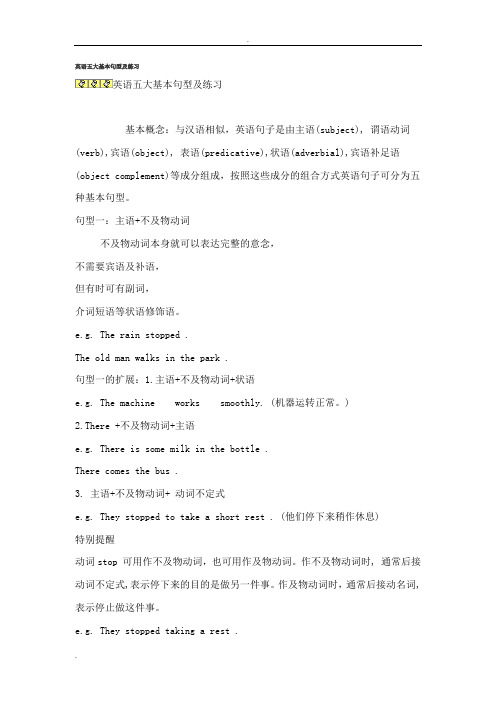
英语五大基本句型及练习英语五大基本句型及练习基本概念:与汉语相似,英语句子是由主语(subject), 谓语动词(verb),宾语(object), 表语(predicative),状语(adverbial),宾语补足语(object complement)等成分组成,按照这些成分的组合方式英语句子可分为五种基本句型。
句型一:主语+不及物动词不及物动词本身就可以表达完整的意念,不需要宾语及补语,但有时可有副词,介词短语等状语修饰语。
e.g. The rain stopped .The old man walks in the park .句型一的扩展:1.主语+不及物动词+状语e.g. The machine works smoothly. (机器运转正常。
)2.There +不及物动词+主语e.g. There is some milk in the bottle .There comes the bus .3. 主语+不及物动词+ 动词不定式e.g. They stopped to take a short rest . (他们停下来稍作休息)特别提醒动词stop 可用作不及物动词,也可用作及物动词。
作不及物动词时, 通常后接动词不定式,表示停下来的目的是做另一件事。
作及物动词时,通常后接动名词,表示停止做这件事。
e.g. They stopped taking a rest .句型二:主语+系动词+表语系动词本身不能表达完整的意念没,需要形容词,名词,介词短语等来补充说明主语,也叫主语补语。
e.g. My sister is a nurse .I feel quite hungry .The ball is under the desk .句型三:主语+及物动词+宾语及物动词本身需要一个动作的接受者(宾语),才可以表达一个完整的意念。
e.g. We are learning English .Do you know him ?Your radio needs repairing .She hopes to see her uncle.句型四:主语+及物动词+间接宾语+直接宾语有些及物动词需要两个宾语才能表达一个完整意念。
(完整版)英语五大基本句型详解及练习(配答案)
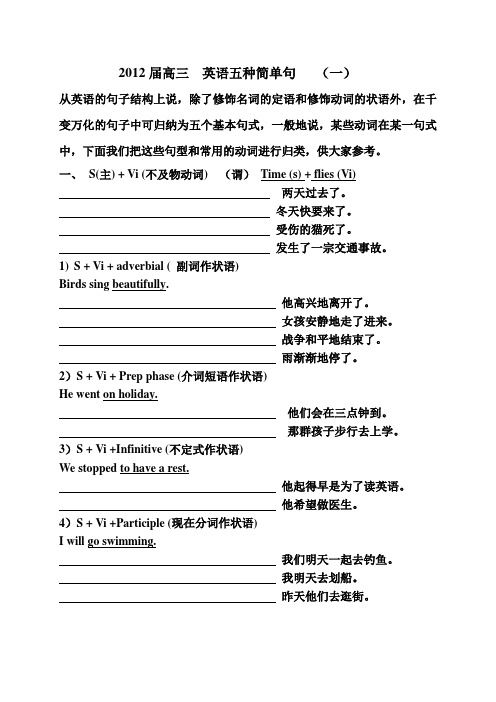
从英语的句子结构上说,除了修饰名词的定语和修饰动词的状语外,在千变万化的句子中可归纳为五个基本句式,一般地说,某些动词在某一句式中,下面我们把这些句型和常用的动词进行归类,供大家参考。
一、S(主) + Vi (不及物动词) (谓)Time (s) + flies (Vi)两天过去了。
冬天快要来了。
受伤的猫死了。
发生了一宗交通事故。
1)S + Vi + adverbial ( 副词作状语)Birds sing beautifully.他高兴地离开了。
女孩安静地走了进来。
战争和平地结束了。
雨渐渐地停了。
2)S + Vi + Prep phase (介词短语作状语)He went on holiday.他们会在三点钟到。
那群孩子步行去上学。
3)S + Vi +Infinitive (不定式作状语)We stopped to have a rest.他起得早是为了读英语。
他希望做医生。
4)S + Vi +Participle (现在分词作状语)I will go swimming.我们明天一起去钓鱼。
我明天去划船。
昨天他们去逛街。
S(主)+ Vt( 及物动词) (谓)+ Object (宾)------- We like English.1)S + Vt + N/ Pron (名词或代词作宾语)I like music. / I like her.他去年教数学。
我们已收到了他们的来信。
2)S + Vt + Infinitive (不定式作宾语)I want to help him.他爸爸期待拥有一家工厂。
他们假装在看书。
我尝试去解决那个问题。
常用于这个句型的动词有:attempt ,dare ,decide, desire, expect, hope, wish, intend, learn, need, offer, pretend, promise, propose, refuse, want, manage, plan, fail, try, agree等。
五种基本句型(含练习及答案)
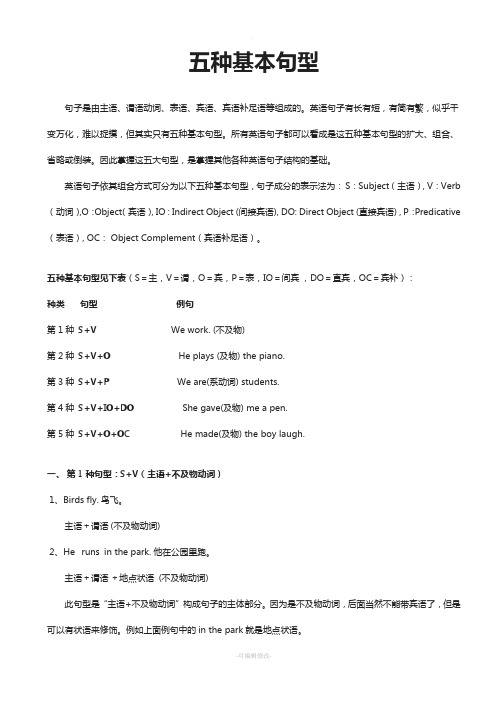
五种基本句型句子是由主语、谓语动词、表语、宾语、宾语补足语等组成的。
英语句子有长有短,有简有繁,似乎千变万化,难以捉摸,但其实只有五种基本句型。
所有英语句子都可以看成是这五种基本句型的扩大、组合、省略或倒装。
因此掌握这五大句型,是掌握其他各种英语句子结构的基础。
英语句子依其组合方式可分为以下五种基本句型,句子成分的表示法为:S:Subject(主语), V:Verb (动词),O:Object(宾语), IO : Indirect Object (间接宾语), DO: Direct Object (直接宾语) , P:Predicative (表语), OC:Object Complement(宾语补足语)。
五种基本句型见下表(S=主,V=谓,O=宾,P=表,IO=间宾,DO=直宾,OC=宾补):种类句型例句第1种S+V We work. (不及物)第2种S+V+O He plays (及物) the piano.第3种S+V+P We are(系动词) students.第4种S+V+IO+DO She gave(及物) me a pen.第5种S+V+O+OC He made(及物) the boy laugh.一、第1种句型:S+V(主语+不及物动词)1、Birds fly.鸟飞。
主语+谓语(不及物动词)2、He runs in the park.他在公园里跑。
主语+谓语+地点状语(不及物动词)此句型是“主语+不及物动词”构成句子的主体部分。
因为是不及物动词,后面当然不能带宾语了,但是可以有状语来修饰。
例如上面例句中的in the park就是地点状语。
3、Class begins.(begin在句中是不及物动词)上课了。
比较:We begin our class at eight.我们八点钟开始上课。
该句则属于第2种句型,begin在句中是及物动词,由此可见有些动词既可作及物动词也可以作不及物动词。
(完整版)五种基本句型(含练习及答案)
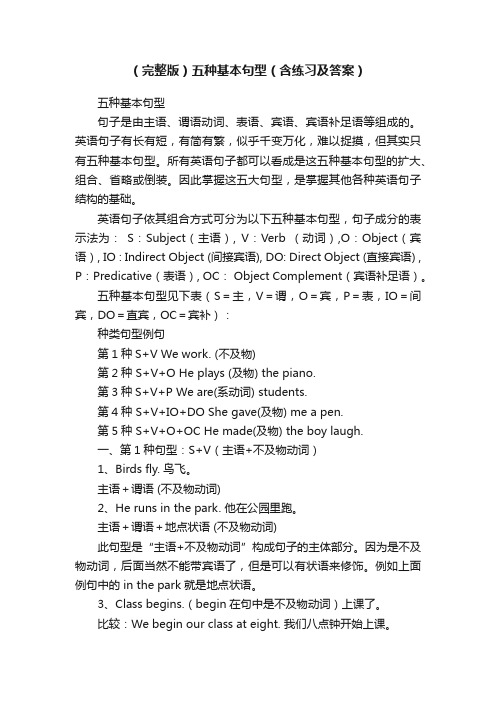
(完整版)五种基本句型(含练习及答案)五种基本句型句子是由主语、谓语动词、表语、宾语、宾语补足语等组成的。
英语句子有长有短,有简有繁,似乎千变万化,难以捉摸,但其实只有五种基本句型。
所有英语句子都可以看成是这五种基本句型的扩大、组合、省略或倒装。
因此掌握这五大句型,是掌握其他各种英语句子结构的基础。
英语句子依其组合方式可分为以下五种基本句型,句子成分的表示法为:S:Subject(主语), V:Verb (动词),O:Object(宾语), IO : Indirect Object (间接宾语), DO: Direct Object (直接宾语) , P:Predicative(表语), OC: Object Complement(宾语补足语)。
五种基本句型见下表(S=主,V=谓,O=宾,P=表,IO=间宾,DO=直宾,OC=宾补):种类句型例句第1种S+V We work. (不及物)第2种 S+V+O He plays (及物) the piano.第3种S+V+P We are(系动词) students.第4种 S+V+IO+DO She gave(及物) me a pen.第5种 S+V+O+OC He made(及物) the boy laugh.一、第1种句型:S+V(主语+不及物动词)1、Birds fly. 鸟飞。
主语+谓语 (不及物动词)2、He runs in the park. 他在公园里跑。
主语+谓语+地点状语 (不及物动词)此句型是“主语+不及物动词”构成句子的主体部分。
因为是不及物动词,后面当然不能带宾语了,但是可以有状语来修饰。
例如上面例句中的 in the park就是地点状语。
3、Class begins.(begin在句中是不及物动词)上课了。
比较:We begin our class at eight. 我们八点钟开始上课。
该句则属于第2种句型,begin在句中是及物动词,由此可见有些动词既可作及物动词也可以作不及物动词。
高中英语 简单句的五种基本句型讲解及练习题
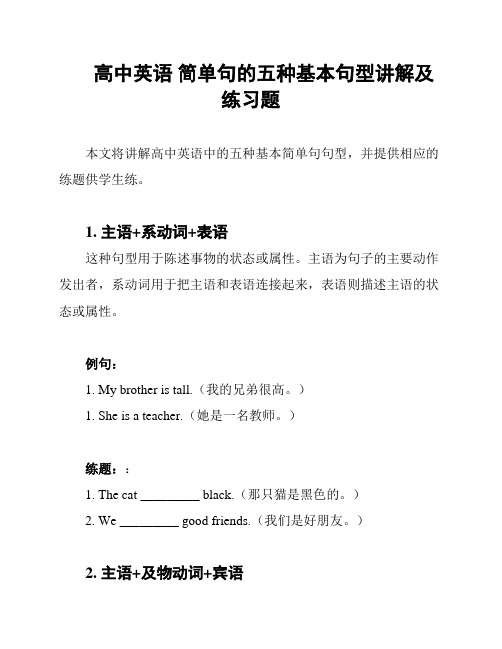
高中英语简单句的五种基本句型讲解及练习题本文将讲解高中英语中的五种基本简单句句型,并提供相应的练题供学生练。
1. 主语+系动词+表语这种句型用于陈述事物的状态或属性。
主语为句子的主要动作发出者,系动词用于把主语和表语连接起来,表语则描述主语的状态或属性。
例句:1. My brother is tall.(我的兄弟很高。
)1. She is a teacher.(她是一名教师。
)练题::1. The cat _________ black.(那只猫是黑色的。
)2. We _________ good friends.(我们是好朋友。
)2. 主语+及物动词+宾语这种句型用于表达主语对宾语进行的动作。
主语是动作的发起者,而宾语是动作的承受者。
例句:1. They read books.(他们读书。
)2. She eats an apple.(她吃了一个苹果。
)练题::1. He plays _________ every day.(他每天打篮球。
)2. We visited _________ yesterday.(我们昨天拜访了一位老师。
)3. 主语+及物动词+间接宾语+直接宾语这种句型用于表达主语把事物或信息传递给间接宾语,并对直接宾语进行的动作。
例句:1. She gave me a gift.(她给了我一个礼物。
)练题::1. He bought _________ a new phone.(他给我买了一部新手机。
)2. My mother cooked _________ a delicious meal.(我妈妈给我煮了一顿美味的饭菜。
)4. 主语+及物动词+宾语+宾语补足语这种句型用于表达主语使宾语处于某种状态。
例句:1. They made him happy.(他们让他快乐。
)练题::1. The music made her _________.(那音乐让她难过。
)2. The teacher found the answer _________.(老师发现了答案正确。
英语五种基本句型详解(有例句分析和习题练习)
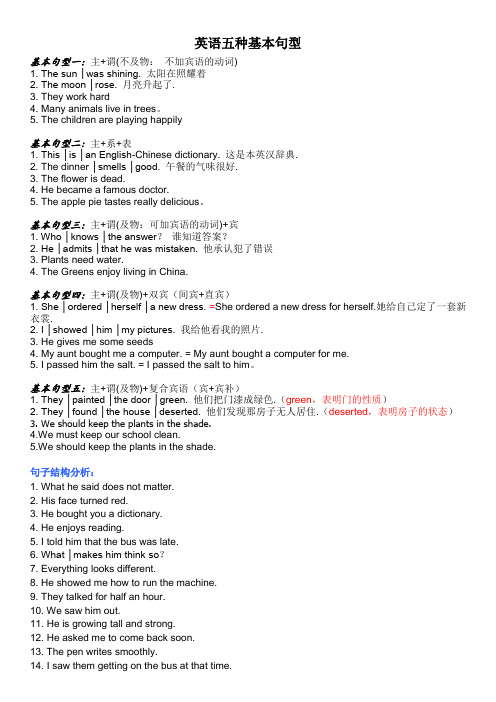
英语五种基本句型基本句型一:主+谓(不及物:不加宾语的动词)1. The sun │was shining. 太阳在照耀着2. The moon │rose. 月亮升起了.3. They work hard4. Many animals live in trees。
5. The children are playing happily基本句型二:主+系+表1. This │is │an English-Chinese dictionary. 这是本英汉辞典.2. The dinne r │smells │good. 午餐的气味很好.3. The flower is dead.4. He became a famous doctor.5. The apple pie tastes really delicious。
基本句型三:主+谓(及物:可加宾语的动词)+宾1. Who │knows │the answer?谁知道答案?2. He │admits │that he was mistaken. 他承认犯了错误3. Plants need water.4. The Greens enjoy living in China.基本句型四:主+谓(及物)+双宾(间宾+直宾)1. She │ordered │herself │a new dress. =She ordered a new dress for herself.她给自己定了一套新衣裳.2. I │showed │him │my pictures. 我给他看我的照片.3. He gives me some seeds4. My aunt bought me a computer. = My aunt bought a computer for me.5. I passed him the salt. = I passed the salt to him。
- 1、下载文档前请自行甄别文档内容的完整性,平台不提供额外的编辑、内容补充、找答案等附加服务。
- 2、"仅部分预览"的文档,不可在线预览部分如存在完整性等问题,可反馈申请退款(可完整预览的文档不适用该条件!)。
- 3、如文档侵犯您的权益,请联系客服反馈,我们会尽快为您处理(人工客服工作时间:9:00-18:30)。
基本句型一: 主+系+表此句型的句子有一个共同的特点:句子谓语动词都不能表达一个完整的意思,必须加上一个表明主语身份或状态的表语构成复合谓语,才能表达完整的意思.这类动词叫做连系动词.系动词分两类:be, look, keep, seem等属一类;get, grow, become, turn等属另一类,表示变化.be 本身没有什么意义,只起连系主语和表语的作用.其它系动词仍保持其部分词义.1. This │is │an English-Chinese dictionary. 这是本英汉辞典.2. The dinner │smells │good. 午餐的气味很好.3. His face │turned │red. 他的脸红了4. Everything │looks │different. 一切看来都不同了.5. He │is growing │tall and strong. 他长得又高又壮.基本句型二: 主+谓(不及物动词)此句型的句子有一个共同特点,即句子的谓语动词都能表达完整的意思.这类动词叫做不及物动词,后面可以跟副词,介词短语,状语从句等.1. The sun │was shining. 太阳在照耀着.2. The moon │rose. 月亮升起了.3. What he said │does not matter. 他所讲的没有什么关系.4. They │talked for half an hour. 他们谈了半个小时.5. The pen │writes smoothly. 这支笔书写流利.基本句型三: 主+谓(及物)+宾语此句型句子的共同特点是:谓语动词都具有实义,都是主语产生的动作,但不能表达完整的意思,必须跟有一个宾语,即动作的承受者,才能使意思完整.这类动词叫做及物动词.1. Who │knows │the answer?谁知道答案?2. He │enjoys │reading. 他喜欢看书.3. He │admits │that he was mistaken. 他承认犯了错误.基本句型四: 主+谓(及物)+双宾(间宾+直宾)此句型的句子有一个共同特点:谓语动词必须跟有两个宾语才能表达完整的意思.这两个宾语一个是动作的直接承受者,另一个是动作的间接承受者.通常这一间接承受者用一个介词来连接,当动作的间接承受者在动作的直接承受者之前时,这一介词往往被省略.1. She │ordered │herself │a new dress. 她给自己定了一套新衣裳.2. I │showed │him │my pictures. 我给他看我的照片.3. He │bought │you │a dictionary.他给你买了一本字典.4. I │told │him │that the bus was late. 我告诉他汽车晚点了.5. He │showed │me │how to run the machine. 他教我开机器.基本句型五: 主+谓(及物)+复合宾语(宾+宾补)此句型的句子的共同特点是:动词虽然是及物动词,但是只跟一个宾语还不能表达完整的意思,必须加上一个补充成分来补足宾语,才能使意思完整.1. They │painted │the door │green. 他们把门漆成绿色.2. They │found │the house │deserted. 他们发现那房子无人居住.3. What │makes │him │think so?他怎么会这样想?.4. We │saw │him │out. 我们送他出去.5. He │asked │me │to come back soon. 他要我早点回来.6. I │saw │them │getting on the bus at that time. 我看见他们当时在上了那辆公共汽车.基本句型一: 主+系+表1. 当时他看起来不高兴。
2. 我喜欢的运动是游泳和滑冰。
3. 我擅长英语。
4. 收到你的来信我很高兴。
5. 在公路对面有一栋新教学楼。
6. 图书馆里有各种各样的书籍、报纸和杂志。
7. 那是在2000年2月8日早上7:15.8. 天变得越来越黑。
9. 这食物吃起来挺可口的。
10. 这故事听起来很有趣。
Key:1. He looked unhappy at that time.2. My favourite sports are swimming and skating.3. I am very good at English.4. I was so pleased to hear from you.5. On the other side of the road there is a new classroom/teaching building.6. In the library there are all kinds of books, newspapers and magazines.7. It was 7:15 on the morning of February 8, 2000.8. It is getting darker and darker.9. The food tastes delicious.10. The story sounds very interesting.基本句型二: 主+谓(不及物动词)1. 1984年至1990年我在光明小学学习。
2. 今天上午,我们在校门口会面然后一起去那里。
3. 时间很快过去了。
4. 这几年我们家乡发生了巨大的变化。
5. 小车没有停而是快速的开走了。
6. 在过去的10年间它的经济发展迅速。
7. 那个年轻人重重地摔倒在地。
8. 过去他早上习惯于早起。
Key:1. I studied in Guangming Primary School from 1984 to 1990.2. This morning we met at the school gate and went there together.3. The time passed quickly.4. Great changes have taken place in our hometown these years.5. The car didn't stop but drove off at great speed.6. Its economy has developed rapidly in the past ten years.7. The young man fell down on the ground hard. 8. He used to get up early in the morning. 基本句型三: 主+谓(及物)+宾1. 去年在学校电脑竞赛中我获得了一等奖。
2. 在业余时间我喜欢听流行音乐和收集邮票。
3.几天前我和我兄弟骑自行车去看电影。
4. 我们也在校园内和周围种上了许多树。
5. 晚上时,我可以看电视新闻或看报纸。
6. 在回家的路上他把钱给丢了。
7. 昨晚大约九点的时候,我正在做作业。
8. 才艺展示(Talent Show)将于6月18日在北京电视台举行。
9. 下午,我将带你们转转,看一看一些名胜。
10. 盼望能尽早见到你。
Key:1. Last year I won first prize in the school computer competition.2. In my spare time I enjoy listening to popular music and collecting stamps.3. The other day my brother and I went to the cinema by bicycle.4. We also planted a lot of trees in and around the school.5. In the evenings I can watch news on TV or read newspapers.6. He lost the money on his way home.7. About 9 o'clock last night, I was doing my homework.8. Talent Show will be held in Beijing Television Station on July 18.9. In the afternoon, I’ll show you around and take you to some places of interest.10. I’m looking forward to meeting you soon.基本句型四: 主+谓(及物)+双宾(间宾+直宾)1. 去年王老师教我们英语。
2. 明天我要给他写封信,告诉他这个好消息。
3. 他们给他提供了一份工作,但他拒绝了。
4. 在我14岁生日时,爸爸给我买了一辆新自行车。
5. 昨晚我花了两小时才完成作业。
6. 对不起,能问你一个问题吗?Key:1. Mr Wang taught us English last year.2. Tomorrow I’ll write him a letter and tell him the good news.3. They offered him a job, but he turned it down.4. On my 14th birthday, Father bought me a new bike.5. It took me two hours to finish my homework last night.6. Excuse me, can I ask you a question?基本句型五: 主+谓(及物)+复合宾语(宾+宾补)1. 当时我看到那些孩子在河边玩。
2. 我们正在使我们的国家变得越来越美丽。
3. 当我到达教室时,我发现里边没有人。
4. 昨天下午在公交车上我的钱包让人给偷了。
5. 我注意到凯特整个早上都在图书馆里看书。
6. 父亲叫我给他带些报纸来。
Key:1. I saw the kids/children playing by the river at that time.2. We are making our country more and more beautiful.3. When I got to the classroom, I found nobody in.4. I had my wallet stolen on a bus yesterday afternoon.5. I noticed Kate reading in the library all the morning.6. Father asked/got me to bring him some newspapers.基本句型翻译综合练习:1. 那噪音太响,我无法继续学习。
